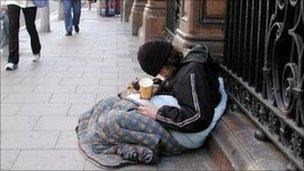Rough sleepers in London increase by 8% to 3,975
- Published

Nearly 4,000 people are sleeping rough on the streets of London, figures show
The number of people sleeping rough on the streets of London has increased, a homelessness charity has said.
In 2010-11, 3,975 people were living on the capital's streets compared with 3,673 in 2009-10, a rise of 8%, according to the charity Broadway.
The Mayor of London's housing advisor repeated a pledge made in 2008 to end rough sleeping in London by the end of next year.
The charity said that despite the increase progress was being made.
London has the highest rate of homelessness in England, according to the charity.
Broadway's annual report showed 1,905 slept rough in Westminster in 2010-11 - by far the highest in London and an increase of 398 on the previous year. Sutton had the lowest number of rough sleepers with a total of three.
The charity said it had helped 1,372 people into accommodation, primarily hostels, in 2010-11.
It said 326 people were helped to return to a "home area" or somewhere they could access appropriate services and 159 were moved into long-term housing.
'Significant progress'
Richard Blakeway, the mayor's housing advisor, said there had been a 75% drop in the "most entrenched" rough sleepers living on London's streets.
The introduction of a new rapid response project, which includes a 24-hour hotline, meant more than half of all rough sleepers spent one night on the street, he said.
The No Second Night Out project has helped 135 people off the streets since it began in April.
"Ending rough sleeping in London by 2012 is a tough challenge but one which the mayor is more determined than ever to achieve," said Mr Blakeway.
"These figures clearly show we have work to do but they also show that significant progress has been made."
He said the mayor's office had recently secured £34m from the government to tackle rough sleeping and this would help support more of London's homeless.
He said City Hall was confident of hitting its targets and of making sure no-one in London "calls the street their home".
'Toxic cocktail'
Jenny Jones, from the Green Party on the London Assembly, said: "Rough sleeping has risen every year under Boris Johnson.
"We face a toxic cocktail of cuts to housing benefit and homelessness charities that could push even more people into temporary accommodation and onto the streets.
"These problems will eclipse the mayor's efforts and they won't be solved by the small concessions he has won on benefit cuts and his small homelessness funding gain.
"It's time he made some noise and called for emergency funding to safeguard all essential pan-London services, otherwise I fear we will see the trends get worse."
Howard Sinclair, chief executive of Broadway, said: "We know exactly the size of the task facing us if we want to reduce rough sleeping to as near to zero as possible by the end of 2012.
"We believe that as long as resources are used in the right way and we continue to work together towards this common aim then we can continue to make a positive and long-lasting difference in the lives of people who end up having to sleep rough in London."
Westminster councillor Daniel Astaire said: "While more people are arriving in the city with nowhere to stay, the numbers who go on to sleep rough long term in Westminster is declining. This is positive progress and we continue to work with local charities and hostels to help people off the streets and into the support services they need."
- Published4 June 2011
- Published2 February 2011
- Published12 January 2011